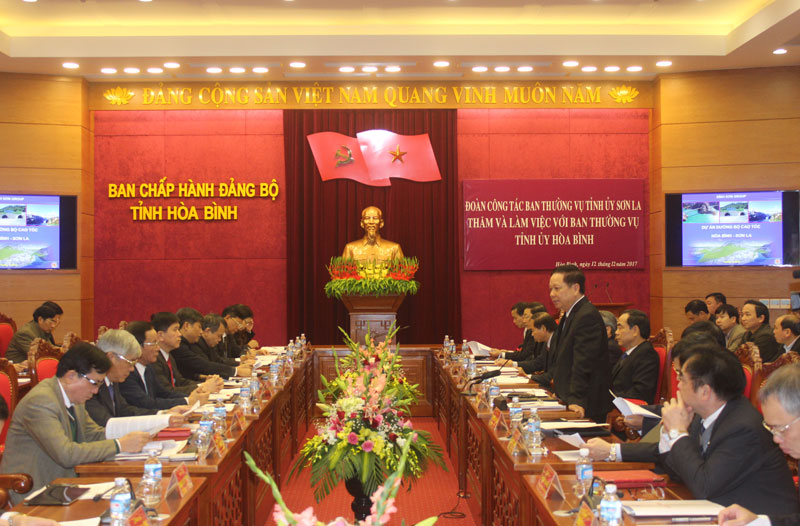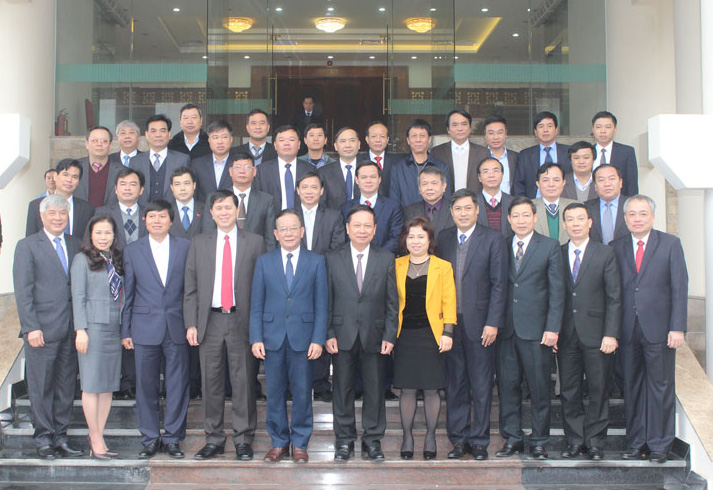


The consensus was reached at a working session between the Standing Boards of the provincial Party Committees of Hoa Binh and Son La in Hoa Binh city on December 12.
The Son La delegation included Secretary of the provincial Party Committee Hoang Van Chat, Deputy Secretaries of the provincial Party Committee Nguyen Huu Dong, Nguyen Dac Quynh, and Cam Ngoc Minh who is also Chairman of the provincial People’s Committee, and officials of Van Ho and Moc Chau districts.
Meanwhile, the Hoa Binh side was represented by Secretary of the provincial Party Committee Bui Van Tinh, Deputy Secretary of the provincial Party Committee and Chairman of the provincial People’s Council Tran Dang Ninh, Deputy Secretary of the provincial Party Committee and Chairman of the provincial People’s Committee Nguyen Van Quang, along with officials of Hoa Binh city and Da Bac district.
Hoa Binh-Son La road was added to Vietnam’s expressway network development plan until 2020. The four-lane expressway is expected to be 189.5km long and 22m wide. It will allow vehicles to travel at 80-100km per hour, shortening the time to drive from Hanoi to Son La to about 2.5 hours. The project will be invested under the forms of public-private partnership (PPP), build-operate-transfer (BOT), and build-transfer (BT).

Secretary of the provincial Hoa Binh Party Committee Bui Van Tinh concludes the working session.
About 49.5km of the expressway’s 85km section from Hoa Binh city to Moc Chau district will traverse Hoa Binh city while the remaining 34.5km will run through Son La province. The section will cover some 870ha of land and have a total investment of 20,864 billion VND (919 million USD).

Leaders of Hoa Binh and Son La provinces at the working session.
At the working session, leaders of the two provinces shared a view that Hoa Binh-Son La expressway is crucial to boosting socio-economic development and ensuring defence-security in the localities as well as the northwestern region of Vietnam as a whole. It is an important condition for the development of the national tourism site of Hoa Binh Lake and Moc Chau.
To ensure the effective implementation of the project, it requires the highest resolve of the authorities and people of Hoa Binh and Son La provines, they noted.
The leaders said in the time ahead, the two sides need to reach consensus on investment procedures and mechanisms, along with technical requirements, financial funding, progress, and the selection of investors for the project. They also need to work with investors to specify the road’s direction and plant markers, and clarify the project’s land area and technical standards.
Concluding the working session, Secretary of the provincial Hoa Binh Party Committee Bui Van Tinh emphasised that the steering committees of the two provinces should make plans and working regulations to soon implement the project. Both sides need to coordinate to re-survey the route so as to have the best construction plan which can ensure the project’s economic feasibility, safety and travel time.
He added that Hoa Binh and Son La should keep regular contract to seek common voice and tackle bottlenecks to accelerate the project’s progress. They also need to work more closely with ministries and central sectors, especially the Ministry of Finance and the Ministry of Planning and Investment, to seek investment capital. Meanwhile, it is also important to increase communication activities to win people’s support for the project./.